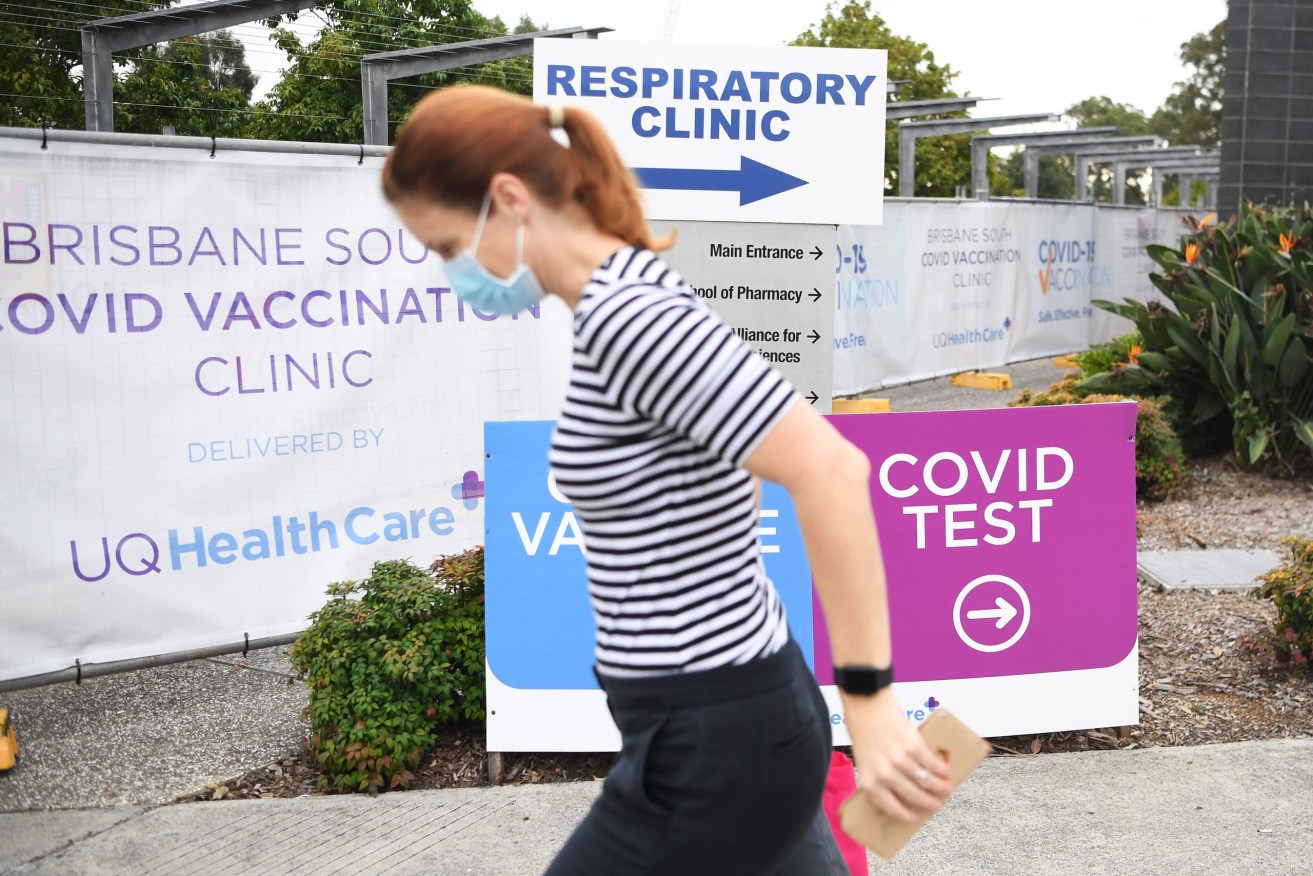More Pfizer on the way as Queensland hits another vaccine milestone
Queensland is delivering more vaccines – including a record 47,485 yesterday – but still lags behind other states, despite the push to guard against future lockdowns.

The entrance to a Covid-19 testing and vaccination clinic in Brisbane. (AAP Image/Dan Peled)
While GPs still do the most jabs, Queensland Health administered 15,853 doses yesterday and is set to surpass one million doses in total by early next week. That comes amid a record number of tests, exceeding 50,000 in two consecutive days.
Deputy Premier Steven Miles today said the Commonwealth had agreed to bring forward the delivery of 112,320 doses of Pfizer as Queensland deals with an outbreak in Brisbane schools.
“They’re not additional vaccines but they will allow Queensland Health to do more vaccinations in August,” Miles said.
Across Australia, more than one million doses are now being administered every week – including a record 220,000 in the past 24 hours – as outbreaks shift the health advice in favour of younger people getting AstraZeneca when Pfizer is not available.
Yet barely one in five eligible Australians, or just over 20 per cent, are fully vaccinated, well short of the 70 per cent and 80 per cent targets needed for governments to start opening back up again.
While supply has been an issue, particularly in relation to Pfizer vaccines, authorities are debating whether lotteries or incentive payments could encourage people to turn out to vaccination clinics. Brisbane City Council today announced its staff would be given time off to do so, while the Queensland Government is considering a union proposal for an extra two days’ leave.
Recently released data indicated Brisbane’s west, including the area subject to the current outbreak, had the highest COVID-19 vaccination rate in Queensland. While the data was was based on statistical areas, without taking into account age or eligibility, the lowest rate was around Mackay-Isaac-Whitsunday, where local federal MP George Christensen continues to rail against lockdowns, coerced vaccinations and his own government’s plan for vaccine passports.
Miles said Prime Minister Scott Morrison and Premier Annastacia Palaszczuk, who remains in hotel quarantine after her recent trip to the Tokyo Olympics, had a “productive conversation” about vaccines last night.
The Commonwealth then informed newspapers of its Pfizer deal, which will primarily benefit any unvaccinated health and aged care workers, and then the thousands of Queenslanders who had registered their interest in Pfizer but expected to wait until September or October for an appointment with Queensland Health.

Lucy Mosby, the manager of the Kubin Primary Health Care Centre on Moa Island, is vaccinated by George Morseau. (Queensland Health)
Queensland Health has made Pfizer a priority in the Torres Strait, where the younger, indigenous population is deemed to be more at risk of severe COVID-19, particularly with high rates of infection in Papua New Guinea and neighbouring Indonesia.
Around half of all eligible people in the Torres Strait have now been vaccinated, and the advance program will next week move to communities on Cape York.
Queensland Health Minister Yvette D’Ath, who made the request for more Pfizer, said half of the doses promised by the Commonwealth would arrive next week, and the other half the following week.
“We will immediately start planning for those extra doses and where we will focus the delivery of those extra vaccines,” D’Ath said.
The last time Queensland asked for more Pfizer it was offered only AstraZeneca, which Australia has in greater supply. Morrison’s recent allocation of another 150,000 doses of AstraZeneca to Queensland – which D’Ath said she learnt of via the media – will be diverted to pharmacies, part of the primary care network that largely has carriage of that particular formula in the state.
Chief Health Officer Jeannette Young had encouraged healthy young Queenslanders to hold out for Pfizer, in line with the advice from expert committee ATAGI in relation to the slightly higher risk of blood clots for those age groups. This week, Young said people should speak to their GP about whether AstraZeneca is now more of an option, given the spread of Delta, which is something ATAGI has also encouraged in relation to the Sydney outbreak.
In terms of the total number of people vaccinated, Queensland still trails the more populated states of NSW and Victoria, which have also had the most cases in the pandemic. Pfizer also makes up a lower proportion of vaccines administered in Queensland, which is ahead of only Western Australia, despite State health hubs focussing primarily on Pfizer.
Miles welcomed the cooperation between the Commonwealth and Queensland, which comes as experts and officials consider new ways to deliver more vaccines expected later this year, and whether children should also be targeted given the spread of the Delta variant in schools.












